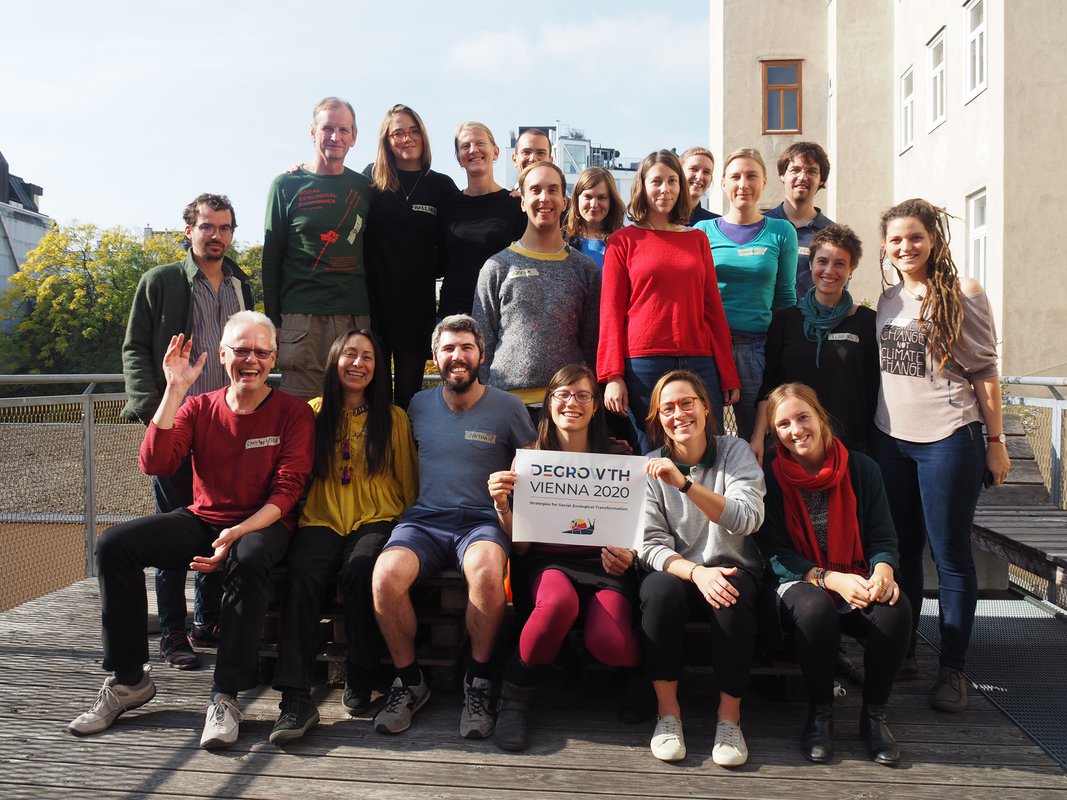Globalised capitalist economies continue to rely on numbers and economic growth, although they reveal little about inequality and sustainable well-being. How people live is not only a question of chance, but strongly influenced by the people in power. The Degrowth movement deeply questions the ways of living, producing and consuming shaped by the powerful, and asks for a democratic approach. It stands for a realizable reorganisation of values, lifestyles and the economy. Recognising that endless economic growth is destructive to human well-being, it calls for the shrinking of some economic segments, specifically those that damage the ecosystem. The meaning of Degrowth is to build economies around segments such as education and care. Both are, among others, examples of undervalued contributors to society, which has been highlighted throughout the coronavirus pandemic. While the pandemic has pointed to the flaws of growth-oriented economies, it is at the same time presenting an opportunity to rethink economic activity. Degrowth stands for more cooperation and less competition, and aims at a democratic, inclusive and socially and environmentally just system.

How we eat, dress, work, spend our leisure, relate to one another and interact with the natural environment; what we value and strive for, and how safe our livelihoods are within a given society is a matter of luck and history. It’s additionally shaped by dominance: by the people in power and their ideas. It’s the stories that we’re being told, and that we keep retelling ourselves as well as the resulting tools, units and measures that seemingly allow us to make sense of the world.
Within most globalised capitalist economies, the predominant means of sense-making are metrics. Most prominently: the GDP. The GDP (gross domestic product), some continue to believe, elegantly and practically captures human development and wellbeing, the state of an economy and hence the state of employment. In a work-centred society, that tends to be seen as equivalent to people’s happiness.
It’s without doubt an inviting idea that such a magic number like the GDP, capturing a bundle of complex phenomena, might exist.
Why GDP fails as a measure of wellbeing
So far, so good. It’s just that this single number known as the GDP is not only reductive, prone to misinterpretation, saying relatively little about non-material wellbeing, such as mental health, and generally overestimated in its power to capture human flourishing.
The GDP fails to capture any economic activities that haven’t been monetised or operate outside of market structures, such as care work.
It thrives on accidents, divorces, and – worst of all – war: everything reason enough to perpetuate production and accumulate capital. In addition, GDP as the chosen measure has helped propagate the idea of infinite economic growth. An idea that has served, first and foremost, the richest 10%, the political elites, the owners of multinational corporations and the fossil industry.
Over the years, researchers have pointed to GDP’s ethical problems, its inability to capture wealth inequality, and its perfect ignorance towards the natural environment within which economies operate, i.e. the planetary boundaries.
To find out more about the topic, Scoop.me provides a video explaining the meaning of Degrowth:
The impossible idea of infinite growth
Ever since the 1970s when the Club of Rome published its seminal report “Limits to Growth”, the growth imperative came to be seen as incompatible with the planet’s natural constraints, and inadequate to address the climate crisis. Resource and labour exploitation – most prominently of women, migrants and children -, soaring greenhouse gas emissions, overproduction, and stubborn profit-centredness all come as a result of economic growth being ruthlessly pursued.
National and international competition has put pressure on wages and social security services, has given preference to fossil-based energy and has increased the wealth differences between the rich and the poor. It has left its marks not only on a society-wide scale, but also in individuals’ lives. High-income Western societies exhibit striking levels of mental illness, particularly among young people.
Neoliberalism, after all, means to live individually, act individually, decide individually and compete against one another for jobs and goods – all at the expense of communal efforts, collaboration and cooperation.
The meaning of Degrowth: a concrete utopia
That economic growth should be pursued as the highest goal within any society is a story that has been told by those reaping the benefits of neoliberal, globalised capitalism. This story is ugly, but it remains the dominant story. But there is an alternative story; one that is worth being looked into, discussed, and shaped by those specifically who will suffer the consequences of continued economic growth on a finite planet the most severely.
The alternative story is by no means fully fledged. Rather, it’s in constant negotiation, and ideally, everyone should contribute their words and phrases for it to become a more democratic story than the one of infinite growth. As a story that consists of an array of ideas, visions and foci, the alternative story is based on a common assumption: the growth imperative is destructive to human and non-human wellbeing within the constraints of planet Earth.
The meaning of degrowth, a notion introduced by social philosopher André Gorz in 1972 as “la décroissance”, has been shaped by different scholars and movements, groups and individuals. It paints scenes of a concrete utopia, i.e. a vision that is understood to be realisable. These scenes depend on a profound reorganisation of the ways in which we eat, dress, work, spend our leisure, and interact with human and non-human nature, as well as a deep shift in values. This might include working time reduction, and labour redistribution, allowing people currently in full-time employment to use their extra time for political work, community-based care, creative pursuits, volunteering, and contributing to shared and decentralised spaces of production such as urban gardens, repair shops etc.
The transformation would also involve a redistribution of power away from the few to the many. It would give preference to local, resilient production rather than to complex global production chains. It would dismantle purposefully destructive design such as planned obsolescence, and instead foster the circular use of materials. It would re-evaluate which jobs are necessary for a society’s wellbeing, and which jobs can be considered – in David Graeber’s language – “bullshit jobs”.
Corona and its exposure of systemic flaws
The COVID-19 pandemic, some have cynically argued, resembles a degrowth scenario: global greenhouse gas emissions have sunk, production and transport have been reduced, shops have been closed and people find themselves at home with their families, reconnecting with the local, the small, the mundane. These effects of COVID-19, however, aren’t degrowth. These are unplanned, messy, largely undemocratic and authoritarian responses to a health crisis. A crisis that has given rise to a socio-economic crisis, and that is embedded in the much larger crisis of climate change.
Let me give you a list of observations during COVID-19 that aren’t degrowth: Some of the most precarious workers’ losing their jobs is not degrowth. An intensification of the double responsibility of women (care work and paid work) is not degrowth. Neither is an increase in domestic violence. Financial markets being flooded with the animal spirits of fear-ridden investors is not degrowth. The poor and elderly dying, and some people, specifically migrants in camps e.g. on Lesbos not having access to basic health care and sanitation is not degrowth.
A lack of universal health care is not degrowth. And neither is the fact that the privileged can easily shift their offices to their homes while others are exposed to infection risks on a daily basis e.g. at supermarket checkouts. None of this is degrowth, rather are these illustrations of the systemic flaws of globalised, neoliberal capitalism and its dynamics that come to the fore when a crisis hits.
The Degrowth movement as a response to Corona
The degrowth movement, in contrast, works towards a democratic, inclusive and socially and ecologically just system”. It is an approach that involves a fundamental rethinking and questioning of what many have come to take for granted, including the systems of production and consumption as well as living and working.
Degrowth asks for a system change, a reorientation, a pathway towards societies that are defined by more cooperation and less competition.
It is an approach that deeply questions the privileges of the powerful and dominant ideologies, and is wary of the profiteers of societal choices. And crucially, it questions the pace of global processes in a hyperactive, at times overbearing world.

Degrowth, as its name reveals, involves a democratic downscaling of some segments of the economy, specifically those harmful to ecosystems such as the fossil industry. In this story, both production and consumption become less important in our everyday lives, specifically for people in the global North. At the same time, those segments that carry true value such as the care sector and education become central to societies. Understandings of development imposed on the Global South by international institutions are being fundamentally challenged.
The buzzword of efficiency as a solution to resource exploitation is rejected on the basis of history, which has taught that increases in efficiency tend to come with a massive backlash (Kallis 2017). The degrowth movement further rejects the idea that economic growth can be achieved without an increase in energy and material use; hence abandoning resource exploitation necessarily means abandoning growth (Kallis 2017).
Where to go from here?
COVID-19 has brought to the fore the instability of our growth-centred economic system, as well as its failure to cater to the needs of the most vulnerable. The instability has shown itself e.g. in disrupted supply chains and collapsing care chains. The spread of the virus has further unveiled the problems of hypermobility and modern forms of living. It has drawn attention to essential and highly undervalued contributors to society: the cashiers, the shop assistants, the nurses, the care workers, the mailmen- and women, the garbage collectors, the harvest workers.
It has unveiled social differences by propagating the model of home office. It has made people rely on technology, which is available only to people of a specific socio-economic status.
And it has opened a box full of questions that are worth being asked, some of which are: what do we want the world to be like post-COVID-19? How should the economy and everyday life be organised? Which changes do we deem necessary to implement? How do we want to work, relate, eat, interact, dress, live?
“In times of crises, seemingly impossible ideas suddenly become possible”, Milton Friedman once said in a very different context with a very different intention. But the gist remains: what of the possible do we want and what must be prevented? We have the option of going back-to-normal as a destructive downhill road. We have the option of fostering right-wing policies, including closed borders and surveillance, or – and I invite you to think about this option just for a moment – we dare to imagine and democratically discuss how to shape and implement a socially and ecologically just system that could shine brighter for all.
Further details and registration can be found HERE.

